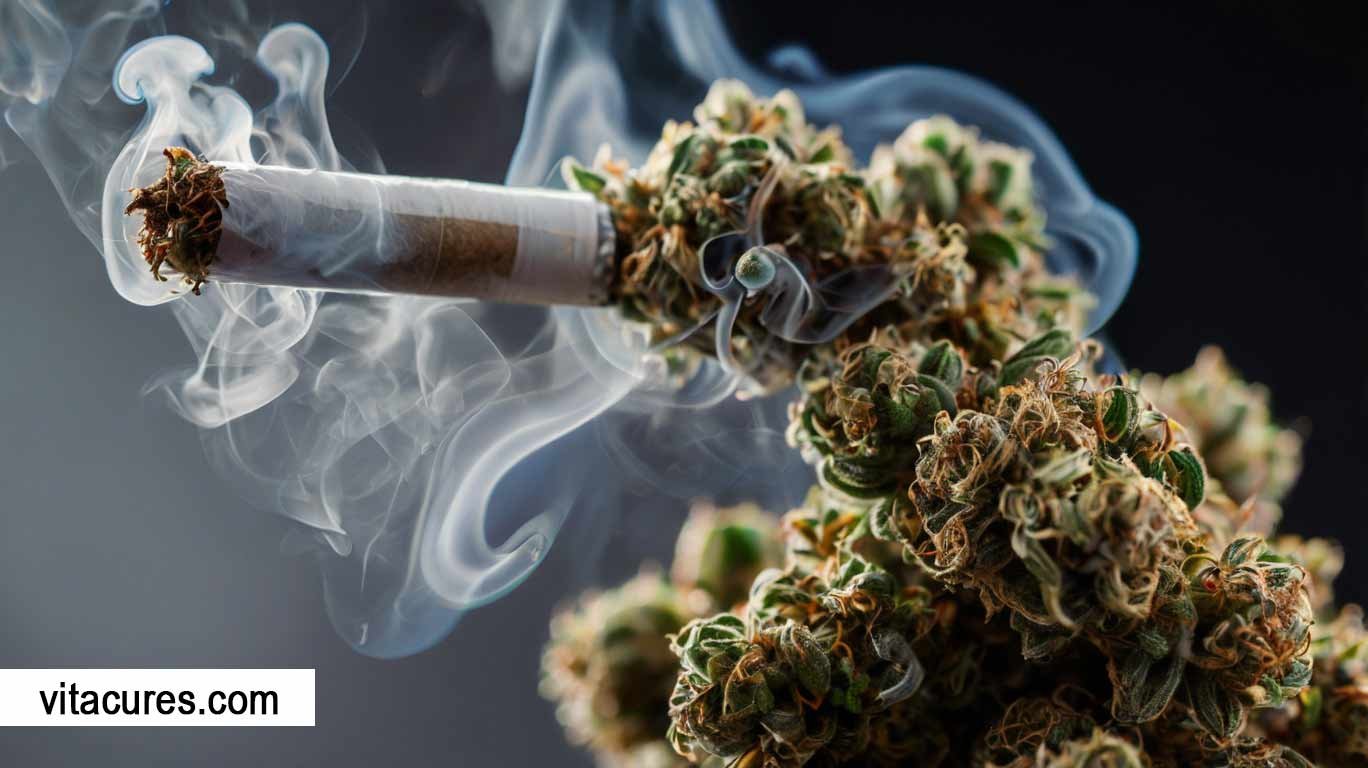Smoking weed does not typically lead to weight loss. In fact, many users experience increased appetite, often referred to as “the munchies.”
The relationship between cannabis and weight is complex. Some studies suggest that certain compounds in marijuana may influence metabolism. THC, the psychoactive component, can stimulate appetite. This often results in cravings for high-calorie foods. Despite anecdotal claims of weight loss, research shows that regular cannabis users may maintain a stable body weight.
Various factors, including lifestyle and diet, play significant roles. Understanding these dynamics can help clarify the effects of cannabis on weight. Individuals interested in weight management should consider these aspects before drawing conclusions about marijuana use and its impact on their health.
Does smoking weed make you lose weight?

Introduction to Weed and Weight
Many people wonder about the connection between cannabis and weight. Some believe that using weed can help with weight loss. Others think it leads to weight gain. This section explores these ideas and the science behind them.
The popularity of cannabis
Cannabis has become very popular in recent years. Many states have legalized its use. People use it for various reasons:
- Recreational use
- Medical benefits
- Stress relief
- Social experiences
Surveys show that more adults are trying cannabis. Many people believe it can help with weight management. This belief has sparked interest in its effects on weight.
Weight Concerns and Cannabis
Weight concerns are common in today’s society. Many people struggle with obesity and weight loss. They often search for effective solutions. Some think cannabis may help them lose weight.
Here are some key points about cannabis and weight:
- Cannabis can increase appetite, known as “the munchies.”
- Some studies show cannabis users may have lower obesity rates.
- Different strains of cannabis may have different effects.
- Individual reactions to cannabis vary widely.
Understanding these points helps clarify the cannabis-weight relationship. We need more research to ascertain its true effectiveness.
Unpacking the Myth
The idea that smoking weed leads to weight loss is popular. Many people believe this claim without understanding its origins. This section will explore how this myth developed and its connection to cannabis culture.
Origins of the Weight Loss Claim
Various sources claim that cannabis can help with weight loss.
- Some studies link cannabis use to lower body mass indexes (BMIs).
- Users often report reduced cravings for unhealthy foods.
- The term “munchies” describes increased appetite after smoking.
These points create confusion. Some think cannabis helps lose weight, while others believe it causes weight gain.
The Cannabis Culture and Body Weight
Cannabis culture has a unique relationship with body image.
- Many cannabis users celebrate body positivity.
- Social media often showcases slim users enjoying cannabis.
- Some believe that cannabis promotes a healthier lifestyle.
These factors contribute to the weight loss myth. Yet, individual experiences vary greatly. Some may gain weight while others might lose it.
Understanding the truth behind the myth is essential. It helps separate fact from fiction about cannabis and body weight.
Cannabis Consumption Methods
Understanding different methods of cannabis consumption is essential. Each method affects the body differently. Let’s explore how smoking and edibles impact weight and metabolism.
Smoking vs. . Edibles
Smoking cannabis is the most common method. Users inhale the smoke from dried flowers. This method offers quick effects. Users often feel the impact within minutes.
Edibles are food products infused with cannabis. They take longer to work. Effects can take 30 minutes to 2 hours to kick in. Edibles can produce a stronger body.
| Method | Onset Time | Duration of Effects |
|---|---|---|
| Smoking | Immediate | 1-3 hours |
| Edibles | 30 min.—2 hours | 4-8 hours |
Both methods have unique effects. Choose wisely based on your needs.
Impact on Metabolism
Cannabis can influence metabolism in various ways. Some studies suggest it may boost metabolism.
- Some users report reduced appetite.
- Others experience increased cravings for sweets.
Research shows cannabis might affect fat storage. THC can increase fat breakdown. This can help with weight loss.
Remember, each person’s body reacts differently. Monitor your own experiences with cannabis. Listen to your body’s signals to understand its effects.
Thc and appetite stimulation
Tetrahydrocannabinol, or THC, is the main psychoactive compound in cannabis. It interacts with the brain’s endocannabinoid system. This interaction can lead to increased appetite. Many users report experiencing a strong desire to eat, often called the “munchies.” Understanding this effect can clarify how smoking weed may influence weight.
The Munchies phenomenon
The munchies are a well-known effect of THC. After consuming cannabis, many people crave snacks. This craving can lead to overeating. Here are some common foods people choose:
- Chips
- Chocolate
- Ice cream
- Fast food
Research shows that THC boosts appetite. It affects specific brain receptors. These receptors control hunger signals. More hunger signals lead to more eating.
Contradictory Effects of Thc
While THC stimulates appetite, its effects can vary. Some people may not experience increased hunger. Factors affecting this include:
- Individual metabolism
- Types of cannabis strains
- Consumption method
Some studies suggest THC can aid weight loss. This is surprising given the munchies. Cannabis users may choose healthier snacks. This choice can balance calorie intake.
| Effect | Impact on Weight |
|---|---|
| Increased Appetite | Potential weight gain |
| Healthier snack choices | Potential Weight Loss |
Understanding THC’s effects helps clarify its role in weight management. The relationship between cannabis and weight is complex.
CBD and Weight Management
CBD, or cannabidiol, is gaining attention for its potential in weight management. This compound interacts with the body’s endocannabinoid system. Research shows promising effects on fat browning and appetite suppression.
Cbd’s Role in Fat Browning
Fat browning is the process of converting white fat into brown fat. Brown fat burns calories to generate heat. CBD may play a key role in this transformation.
- White fat stores energy and contributes to obesity.
- Brown fat burns energy and aids in weight loss.
Studies suggest that CBD can enhance the browning of white fat. This effect can lead to increased calorie burning.
Appetite Suppression
CBD may help reduce appetite. Many people associate cannabis with increased hunger, known as “the munchies.” However, CBD works differently.
- Reduces cravings for unhealthy foods.
- Promotes feelings of fullness.
Research indicates that CBD may influence appetite-regulating hormones. Lower levels of these hormones can help in weight management.
Understanding CBD’s effects on appetite can guide healthier choices.
Metabolic Factors
Understanding the metabolic factors of cannabis use is essential. Many wonder how smoking weed influences weight. The relationship between cannabis and metabolism is complex.
Cannabis impacts metabolism.
Cannabis affects the body’s metabolism in various ways:
- Appetite stimulation: Cannabis can increase hunger.
- Caloric intake: More food often leads to weight gain.
- Energy expenditure: Some studies show cannabis may enhance calorie burn.
- Cannabis may affect the oxidation of fat.
Individual responses to cannabis vary. Some may experience weight loss, while others gain weight. Understanding your unique reaction is crucial.
Thc and Fat Storage
Tetrahydrocannabinol (THC) plays a significant role in fat storage.
| Effect | Description |
|---|---|
| Increased appetite | THC activates receptors that boost hunger. |
| Fat storage | THC may increase the storage of fat. |
| Metabolic rate | Some studies suggest THC can raise metabolic rate. |
Balancing THC intake may help manage weight. Understanding its effects on fat storage is vital for weight management.
Psychological Aspects
The relationship between smoking marijuana and weight involves complex psychological factors. Understanding these factors can help clarify how cannabis affects eating behaviors and weight control.
Stress, anxiety, and eating habits.
Stress and anxiety can significantly impact eating habits. Many people turn to food for comfort during tough times.
- Stress: increases cravings for unhealthy foods.
- Anxiety: May lead to emotional eating.
- Cannabis: It can reduce stress and anxiety levels.
Smoking weed might help some individuals manage their stress. This can lead to healthier eating choices. It may also reduce the urge to snack on junk food.
Mood regulation and weight
Mood plays a crucial role in weight management. A positive mood often leads to better eating habits.
| Mood State | Eating Behavior | Impact on Weight |
|---|---|---|
| Happy | Balanced meals | Weight maintenance |
| Stressed | Emotional eating | Weight gain |
| Anxious | Overeating | Weight gain |
Cannabis may help improve mood for some users. This can lead to healthier eating patterns. Positive mood changes can support weight loss efforts.
Understanding these psychological aspects provides insight into how smoking weed affects weight. It is essential to consider individual differences in responses to cannabis.
Lifestyle and consumption habits
The relationship between cannabis use and weight is complex. Lifestyle choices and consumption habits play a crucial role. Understanding these factors helps clarify how smoking weed may influence weight loss.
Typical Consumer Lifestyle
Cannabis users often have distinct lifestyles. These lifestyles can significantly impact their overall health and weight. Here are some common traits:
- Preference for relaxed social settings.
- Increased snack consumption during use.
- Cravings influence a variety of dietary choices.
- Shift in daily routines and sleep patterns.
These factors can contribute to either weight gain or loss. For example, increased snacking may lead to weight gain. On the other hand, some users may eat less due to appetite suppression.
Exercise and marijuana users
Many cannabis users integrate exercise into their routines. Cannabis can enhance physical activities for some people. Here’s how:
- Improved focus during workouts.
- Heightened enjoyment of physical activities.
- Reduced anxiety before exercising.
Exercise habits vary among users:
| Activity Type | Frequency |
|---|---|
| Yoga | 3–4 times a week. |
| Cardio | 2-3 times a week |
| Strength Training | Two times a week. |
Exercise may counterbalance any weight gain from cannabis use. Users who stay active often maintain a healthier weight.
Clinical studies and research
Understanding the relationship between cannabis and weight loss involves examining various scientific studies. Researchers explore how cannabis affects appetite, metabolism, and body weight. Here are some key findings and limitations from recent research.
Recent Findings On Cannabis And Weight
Several studies indicate a surprising connection between cannabis use and weight management. Here are some notable points:
- Cannabinoids may influence metabolism.
- Regular cannabis users often have lower body mass indexes (BMIs).
- Some research suggests cannabis may reduce fat storage.
- A study showed that THC could increase calorie burning.
These findings suggest that cannabis may play a role in weight management, but more research is necessary.
Limitations of Current Research
Despite interesting findings, current studies are hindered by several limitations.
- Most studies rely on self-reported data.
- Sample sizes are often small and not diverse.
- Long-term effects of cannabis on weight are unclear.
- Research often lacks control groups for comparison.
These limitations highlight the need for more robust studies. Understanding the full impact of cannabis on weight loss requires further investigation.
Cannabis Strains and Their Effects

Understanding cannabis strains aids in understanding their effects on weight. Different strains interact with the body uniquely. This interaction can influence appetite and metabolism.
Sativa
Sativa strains are known for their uplifting effects. Users often feel energized and creative. These strains have the potential to suppress appetite in certain individuals. Here are some popular Sativa strains:
- Green Crack boosts energy and focus.
- Durban Poison: enhances creativity and sociability.
- Jack Herer: Promotes mental clarity and motivation.
Indica
Indica strains often have calming effects. They may lead to increased appetite, commonly known as “the munchies.” Users feel relaxed and sleepy. Popular Indica strains include:
- Granddaddy Purple is renowned for his ability to relax and induce sleep.
- The Northern Lights offer deep relaxation and satiation.
- Bubba Kush: Induces calmness and cravings.
Strain potency and caloric intake
Strain potency plays a role in caloric intake. Higher THC levels can increase appetite. This effect varies based on the individual. Consider the following:
| Strain Type | THC Level | Appetite Effect |
|---|---|---|
| Sativa | Moderate | Possible appetite suppression |
| Indica | High | Increased appetite |
Understanding these effects helps in making informed choices. Personal experiences may vary. Always consider individual reactions to different strains.
Testimonials and Personal Stories
Many people share their experiences about smoking weed and weight changes. Their stories provide insights into how cannabis affects weight. Here are some success stories and accounts of unexpected changes.
Success Stories
Some individuals have seen positive effects on their weight after using cannabis. Here are a few remarkable testimonials:
- Jessica, 28: “I lost 15 pounds after starting to smoke weed. I felt less hungry during the day.”
- Mark, 35: “After using cannabis, my cravings for junk food disappeared. I now eat healthier.”
- Linda, 22: “I found that smoking helped me manage my stress. I stopped binge-eating.”
These stories demonstrate the connection between cannabis use and weight loss in some individuals. Each story is unique and reflects personal choices.
Unexpected Weight Changes
Not everyone has the same experience with cannabis. Some report surprising weight gains instead of losses.
- Tom, 30: “I gained 10 pounds after starting to smoke. I craved snacks more often.”
- Sara, 26: “I thought it would help me lose weight. Instead, I found myself overeating.”
- Brian, 40: “I never expected to gain weight, but it happened. I guess it varies by person.”
These testimonials show the mixed results of cannabis use. Every person’s body reacts differently to smoking weed. Understanding these experiences can help others make informed choices.
Nutritional Implications
Understanding the nutritional implications of cannabis use is essential. Many people wonder if smoking weed affects their diet and weight. Research shows mixed results. Some users may experience changes in their eating habits.
Cannabis Users’ Diet Patterns
Cannabis users often display distinct dietary patterns. These patterns can influence weight management. Key points include:
- Increased cravings: Users may crave high-calorie foods.
- Snacking habits: Frequent snacking can lead to weight gain.
- Food choices: Preference for sugary or fatty foods is common.
Calorie intake and nutrition
The caloric intake of cannabis users can differ significantly. Here are some important aspects:
| Factor | Impact on Caloric Intake |
|---|---|
| Hunger Stimulation | Increases overall caloric consumption |
| Food Preferences | Leads to choosing calorie-dense options |
| Meal Timing | May result in irregular eating patterns |
Balancing caloric intake is vital. Users must consider their overall nutrition. Focusing on healthy choices can help manage weight effectively.
Medical Marijuana and Weight Management
Medical marijuana is gaining attention for its potential benefits in weight management. Some studies suggest it can help patients with weight disorders. It may also influence body mass index (BMI) positively.
Prescribed usage for weight disorders
Healthcare providers may prescribe medical marijuana for various weight disorders. Here are some conditions where it might be useful:
- Anorexia: Helps increase appetite.
- Cachexia: Aids in weight gain for cancer patients.
- Obesity can help regulate metabolism.
Doctors recommend specific strains for different needs. Indica strains may relax the body and stimulate hunger. Sativa strains can boost energy and promote activity.
Impact on Patients’ BMI
Studies show that medical marijuana can influence BMI in several ways:
| Condition | Effect on BMI |
|---|---|
| Anorexia | Increases BMI through appetite stimulation |
| Cachexia | Promotes weight gain during treatment |
| Obesity | May help regulate weight through metabolism |
Patients using medical marijuana often report improved appetite and weight stability. It can lead to a healthier body composition over time.
The Role of Exercise
Exercise plays a vital role in weight management. Many people wonder how cannabis affects physical activity. Understanding this relationship can help clarify its impact on weight loss.
Activity Levels Among Cannabis Users
Research shows diverse activity levels in cannabis users. Some engage in regular exercise, while others remain sedentary. Here’s a breakdown of activity levels:
| Activity Level | Percentage of Users |
|---|---|
| Highly Active | 30% |
| Moderately Active | 40% |
| Sedentary | 30% |
Many cannabis users report increased motivation for exercise. Others may feel more relaxed and less inclined to move. This varies by individual experiences and preferences.
Cannabis as a Pre-Workout Supplement
Some individuals use cannabis before exercising. They believe it enhances their workout experience. Here are some potential benefits:
- Increased focus: Cannabis can help some users concentrate.
- Reduced pain: It may alleviate discomfort during workouts.
- Improved mood: Users often feel happier and more motivated.
However, effects differ from person to person. Some may feel sleepy or unmotivated after using cannabis. It’s essential to understand individual responses before incorporating them into a workout routine.
Always consult a healthcare professional before making changes to your exercise or cannabis use. Understanding your body helps create a balanced approach to fitness.
Weighing the evidence.
The relationship between smoking weed and weight loss sparks curiosity. Some studies show a connection, while others do not. Understanding the evidence helps clarify this topic.
Balancing the Scales
Research on cannabis and weight has mixed results. Here are some key findings:
| Study | Findings |
|---|---|
| Study 1 | Found lower BMI among regular users. |
| Study 2 | Cannabis use did not significantly reduce weight. |
| Study 3 | Users reported increased appetite but lower obesity rates. |
- THC can stimulate appetite.
- Increased cravings may lead to weight gain.
- Cannabinoids may influence metabolism.
Some users experience weight loss due to lifestyle changes. Exercise and diet can shift with cannabis use. Understanding individual responses is crucial.
Future Directions in Research
We need more studies to fully understand this complex relationship. Here are some potential research areas:
- Different cannabis strains have varying effects on weight.
- Cannabis use has a long-term impact on metabolism.
- Role of cannabinoids in appetite regulation.
- Comparative studies between users and non-users.
Exploring these areas may shed light on how cannabis affects weight. The findings could help guide user choices. Understanding personal responses remains essential.
Frequently Asked Questions
Does smoking weed help with weight loss?
Smoking weed can affect weight loss differently. Some studies suggest that cannabis may alter metabolism and appetite. However, many users experience increased hunger, commonly referred to as “the munchies.” Thus, while it may have potential benefits, it’s not a guaranteed method for weight loss.
Can Cannabis Increase Metabolism?
Cannabis may impact your metabolism. Some compounds in marijuana, like THC, could influence how your body processes food. However, research is still inconclusive. Individual experiences vary, and other lifestyle factors play a significant role in overall metabolism and weight management.
Does weed make you hungry?
Yes, weed can make you hungry. The chemical THC in cannabis stimulates appetite, often leading to increased cravings. This phenomenon, known as “the munchies,” can lead to overeating. While some may see this as a downside, others might find it beneficial, especially for those struggling with appetite.
Are There Weight Loss Benefits Of Cbd?
CBD, a non-psychoactive compound in cannabis, may aid weight loss. Some research suggests CBD can help regulate metabolism and reduce appetite. However, further studies are necessary to validate these effects. It’s important to approach CBD with realistic expectations and consider overall lifestyle changes for weight loss.
Conclusion
Smoking weed may influence weight loss, but the effects vary widely among individuals. Some users report decreased appetite, while others experience cravings for unhealthy snacks. Understanding these dynamics is essential for making informed choices. Always consider consulting a healthcare professional for personalized advice on weight management and cannabis use.



